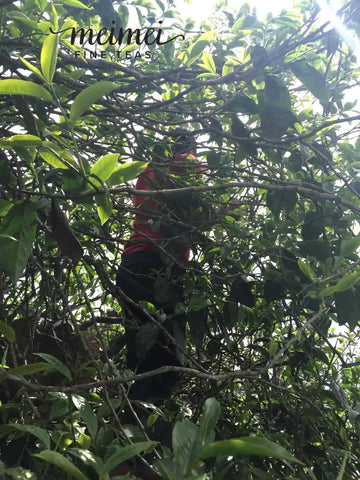
Pu’erh You Should Know: A Brief Introduction to Mengku Pu’erh

Mengku is one of the four major pu’erh production areas in Yunnan province, and though its fame skyrocketed in the early aughts with some excellent marketing by Shuangjiang Mengku, a pu’erh tea factory, it would be unfair and inaccurate to say that this fame was undeserved.
On the contrary, Mengku’s strong reputation has persisted for more than a decade, and there’s no sign that it is letting up any time soon. This is for good reason. The pu’erh from this region truly is remarkable, and much of this has to do with the unique terroir of the area, especially that of Da Xue Shan or “Big Snowy Mountain” (大雪山).
Da Xue Shan stands nearly 3300m high (more than 10,000 ft), and although its name might suggest that it features a peak of perpetual snow, the truth is that the weather here is about as ideal as it can be for the flourishing of tea bushes. There is snow on the summit of Da Xue Shan occasionally, but for the most part, it is relatively rare.
Sprinkled throughout Da Xue Shan are a number of villages, and two of those at the highest elevations are Xiao Hu Sai (小户赛) and Da Hu Sai (大户赛), each positioned at opposite ends of a mountain ridge that serves as a natural boundary for Da Xue Shan park and national forest, an area accessible only with special permission from government authorities. Between the two, Da Hu Sai provides far easier access to this forest than the more isolated Xiao Hu Sai.

Technically speaking, Xiao Hu Sai is comprised of three smaller villages. Two of these belong to Lahu people (拉祜族), one of the many ethnic minority groups recognized and protected by the Chinese government, and the third belongs to the traditional Han Chinese (漢人). By contrast, Da Hu Sai is predominantly populated by a mix of La Hu and Han.
Although neither village is as popular as Bing Dao, they have been receiving an increased amount of recognition year over year. For Xiao Hu Sai, this is largely owed to the large number and quality of the nearby gushu (古树) pu’erh trees. Sandwiched between several sources of water, these trees provide a constant stream of nourishment, helping them flourish. The leaves from these trees have long been a source of food and a best-kept secret for the locals.

Approximately parallel from Xiao Hu Sai on the eastern portion of the mountain ridge sits Da Hu Sai. It is located at a slightly higher elevation from Xiao Hu Sai, and while it has been less well-known for its teas, it has always been more frequently visited for its easier access to Da Xue Shan national forest. Although tea gardens are nearby, many residents will venture forth and harvest leaves from wild pu’erh trees, providing for a more robust and complex flavor.
While the teas from both of these villages are excellent, on the eastern side of Da Xue Shan and at a lower elevation lies Bing Dao (冰岛), one of the most highly regarded pu’erh production areas in the world. Like Xiao Hu Sai, the Bing Dao area holds five smaller villages, but more importantly, it is the unique terroir of this place that imparts a distinctive character to its teas. It is this terroir that has caught the attention of tea drinkers everywhere, and for this reason, it is becoming known as the “Champagne of China,” the tea equivalent of the famous wine-producing region in France. There is simply no comparison to be made between Bing Dao and the rest.
Even though Bing Dao reigns supreme (and carries the highest price point) amongst Mengku teas, in truth, so many of these teas are outstanding. They have tremendous energy, inclining so many Mengku pu’erh drinkers to comment on how relaxed and focused they feel when sipping these teas. They also tend to be the most accessible in terms of taste for those new to pu’erh. You simply cannot go wrong with a Mengku pu’erh.